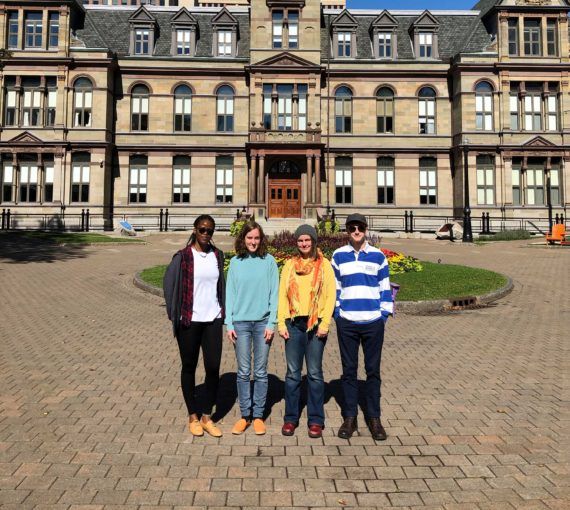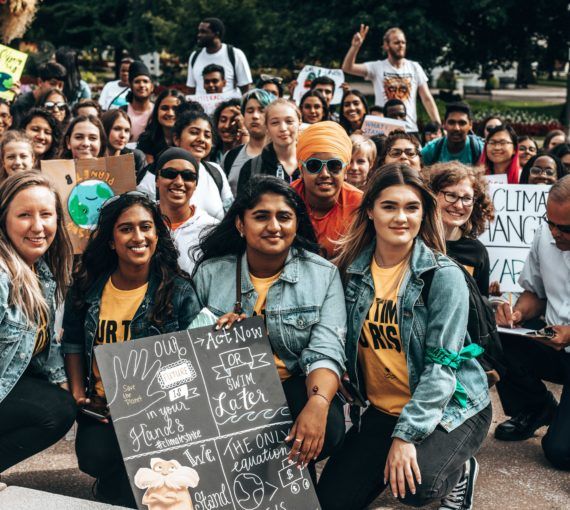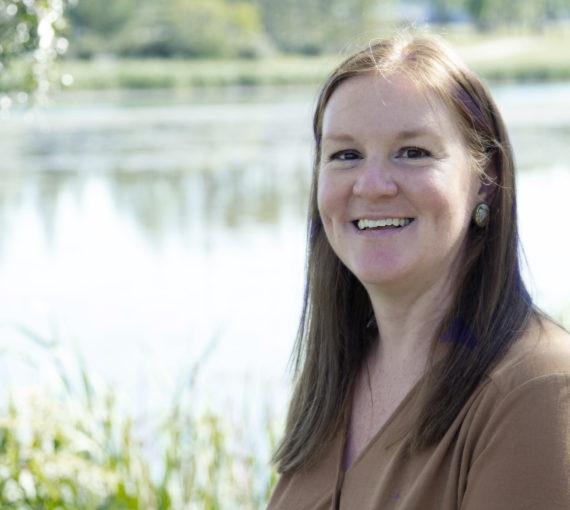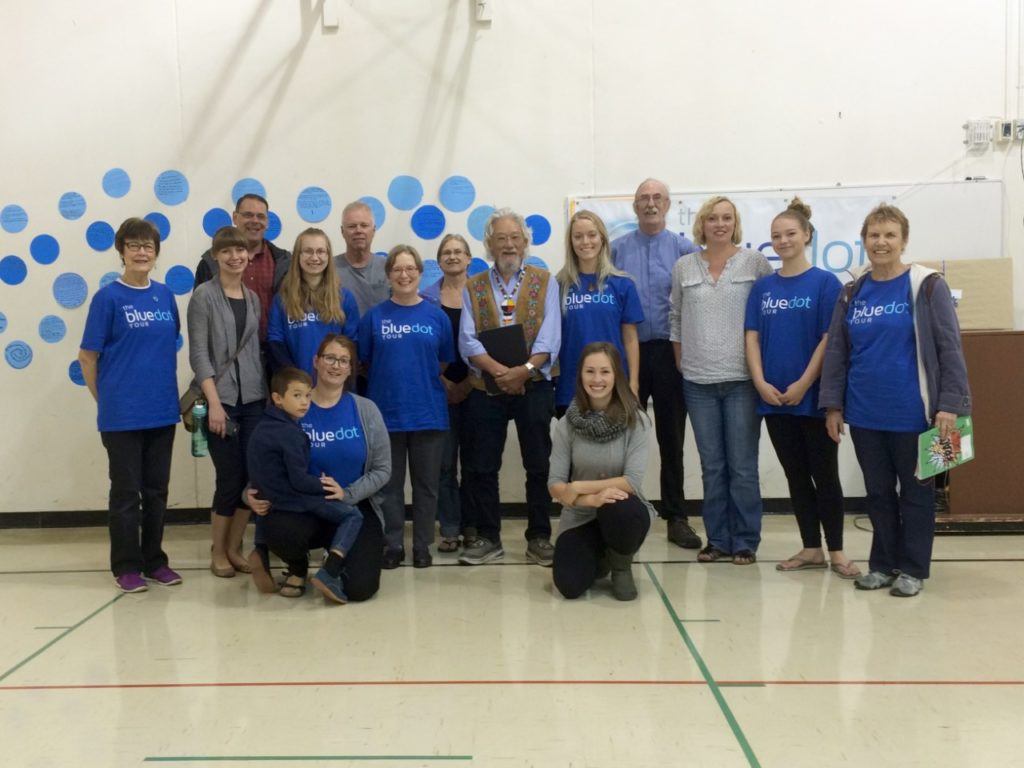
Yvette Crane and the members of the Regina Blue Dot group meet David Suzuki. (Photo: BlueDot Regina)
Regina resident Yvette Crane recalls a moment from her childhood. “I remember asking my mom, ‘What does government mean?’ She kind of paused, then said, ‘Well, the government is us. The government is the people.’”
As a child, Yvette shook her head at the typical grown-up answer and walked away, unimpressed. But her mother’s words must have stuck with her, as decades later she’s a dedicated champion of climate action in Regina, and her municipal advocacy efforts have resulted in big changes for the city.
Yvette first got involved in municipal politics in 2015, when she joined the Blue Dot movement after David Suzuki’s cross-Canada tour. The Regina Blue Dot group, initially led by volunteer Kelly Husack, then later Yvette herself, aimed to convince the city to approve a declaration that acknowledged people’s right to a healthy environment.
The group worked on this goal for two years, during which time Yvette learned valuable lessons about how municipal governments work and how to make successful presentations to council.
We had to follow up on that motion and make sure it unfolded the way we believed it should. It would have been very easy to say, ‘Okay we got it passed. Now it’s up to the city — we’re not involved anymore.’ But none of us did that.
Yvette Crane
It took several attempts for the motion to pass, but in March 2017, Regina city council approved the declaration. That success left Yvette feeling motivated to take on another municipal initiative. She didn’t have to wait long. A progressive city councillor soon decided to propose a motion to make Regina a 100 per cent renewable city by 2050. The Blue Dot group assembled to support him, and more residents joined as word spread throughout the city.
“The nice thing about Regina is that it’s a small enough community,” Yvette says. “We have a population of 230,000. So, if you start something, most of the people who need and want to know about it will hear about it.”
In October 2018, council voted unanimously to make Regina a 100 per cent renewable city by 2050.
“That was one of my proudest moments as an environmentalist,” she recalls. “It was unanimous — all city council voted for it, even the mayor and a few councillors who had really been digging in their heels. City council chambers was packed, and there was a standing ovation. It was just fantastic.”
But the path to a renewable city wasn’t as smooth as she and her fellow volunteers expected. After some delay, city staff came back with a report outlining the proposed plan, which to Yvette’s dismay did not reflect the original spirit of the motion and would not make the city 100 per cent renewable. To make matters worse, in 2020 the city revealed plans for a controversial sustainability conference featuring a well-known climate science denier as keynote speaker. (The city eventually rescinded the invitation, and the conference was cancelled due to COVID-19.)
When the city released a second report, just as disappointing as the first, local advocates were prepared. Many made delegations and took council and staff to task for abandoning the original spirit of the motion. City administration was told to create a new plan more in line with the original motion, and in October 2020, two years after the motion first passed, staff presented a new framework, which city council approved nearly unanimously and which local advocates celebrated.
It was an important lesson for Yvette: her job didn’t end with a motion being passed. “We had to follow up on that motion and make sure it unfolded the way we believed it should,” she says. “It would have been very easy to say, ‘Okay we got it passed. Now it’s up to the city — we’re not involved anymore.’ But none of us did that.”
If there’s something you really feel strongly about, you’ve got to follow up. If the issue is really important to you, don’t assume they’ll contact you.
Yvette Crane
She and her fellow advocates continued to show up at council meetings, make deputations and remind their councillors of the sustainable future they want for Regina. Their tenacity paid off: dedicated city staff are now working on an action plan to make the city 100 per cent renewable.
Yvette shares this advice with anyone wanting to take similar action in their city: “If there’s something you really feel strongly about, you’ve got to follow up. If the issue is really important to you, don’t assume they’ll contact you.”
She also advises people to consider how many issues their city councillors have to deal with. One of the first times she spoke at a council meeting, she opened the agenda to determine when she’d be speaking and found that it was close to 300 pages long!
“That gave me a good understanding of what they have on their plates and made me a bit more forgiving when something fell through the cracks. You’ve got to cut through all that noise and make it easy for them to focus on your issue. You need to keep telling them, ‘This is important. You need to know about this. This is coming up, and I expect you as my city councillor to vote this way.’”
She adds that residents can also act as council’s “city or corporate memory,” which is particularly helpful for new councillors who lack historical context on an issue.
We need to be there when the plan comes out, making sure nothing sneaky has happened with our wonderful framework. We need to make sure it’s what we want it to be.
Yvette Crane
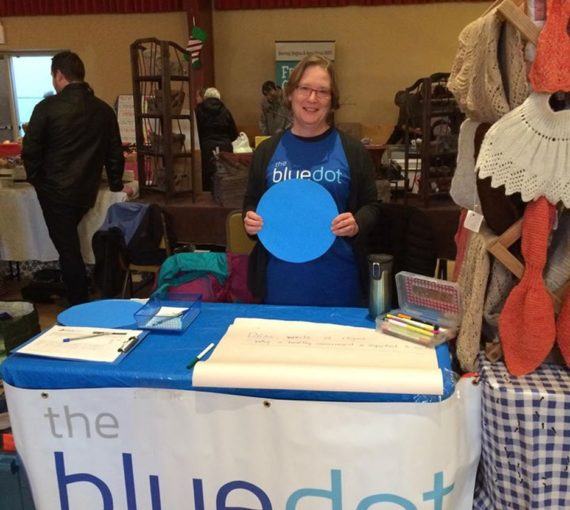
These days, Yvette makes a point of staying up-to-date on Regina’s ever-evolving sustainability framework. She has joined the Regina Energy Transitions group, whose members support councillors in implementing the Renewable Regina motion and the Energy and Sustainability Framework. She’s also looking forward to an important council meeting in December, when city staff will present an action plan to council for consideration.
“All of us who care need to have that date marked in our calendars,” she says. “We need to be there when the plan comes out, making sure nothing sneaky has happened with our wonderful framework. We need to make sure it’s what we want it to be.”
All these years later, Yvette is still thinking about her mother’s definition of government as “us, the people.”
“She was exactly right,” she says. “That’s what government is.” And she takes her role in Regina’s government to heart.
This story is part of Your Voice at the Table: a Guide to Mobilizing Local Government Climate Action.

